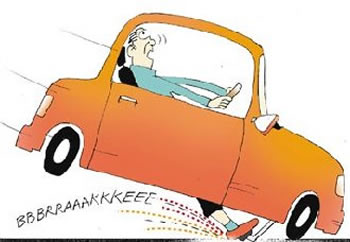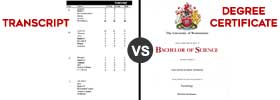Difference between Break and Brake
Key Difference: The most popular definition of break is to separate something into multiple pieces using force. The most popular definition of a brake is the noun, which is the mechanism in a car that allows it to slow down or come to a complete stop.
 The words break and brake are often confused and used interchangeably because they sound the same. However, the words have complete different meanings even if they do sound exactly the same.
The words break and brake are often confused and used interchangeably because they sound the same. However, the words have complete different meanings even if they do sound exactly the same.
The similarity in pronunciation is because the words ‘break’ and ‘brake’ are actually homophones. Homophones are words that have the same pronunciation, but are spelled differently and have different meanings. Examples of homophones include hear/here, buy/by/bye, hour/our, etc.
And since the words sound exactly the same when pronounced, it is often confusing for a lot of newbies to understand which word is used when and in what context. Let’s take a closer look at the two words mean and how they differ from each other.
The word Break has a few different definitions that can be used in multiple contexts. It can also be used a verb as well as a noun. The most popular definition of break is that it is used to separate something into multiple pieces using force. For example – breaking a cup will result in smashing the cup until it is in multiple pieces. It can also be used as a noun, which means the act or action of breaking. For example – There was a break in the newly built dam.
Other definitions for break include:
- to cause an open wound (as a transitive verb)
- violate something (as a transitive verb)
- to force entry into or burst a way through (as a transitive verb)
- to escape with sudden forceful effort (as a intransitive verb)
- to come apart or split into pieces (as a intransitive verb)
- to interrupt one's activity or occupation for a brief period (as a intransitive verb)
Examples of break:
- The skin broke open when she removed the thorn. (transitive verb)
- He broke the law when he ran the red light. (transitive verb)
- The kid ran through the throng of marchers.
- The vase broke when it fell from the shelf.
- He took a break from working for a quick snack.
The word Brake also has a few different definitions and usage. It can also be used as a transitive and an intransitive verb. However, the most popular definition of a brake is the noun, which is the mechanism in a car that allows it to slow down or come to a complete stop. For example – the emergency brakes in the car failed. As a verb, the word brake refers to the act of braking. For example – he started braking after he saw the dog run into the street.
Definitions of brake:
- to slow or stop by or as if by a brake (as a transitive verb)
- to operate or manage a brake (as an intransitive verb)
- a device for arresting or preventing the motion of a mechanism usually by means of friction (noun)
 Examples of breaking:
Examples of breaking:
- Breaking the car is mandatory to let school children pass. (as a transitive verb)
- Tom knew he will have to brake after the upcoming bend in the road. (as an intransitive verb)
- The car brakes weren’t working properly, so Killian got them checked by the mechanic. (noun)
The most common confusion between the two arrives in knowing when to use the two words. Here’s an easy way to remember when to use them – the word break is a part of the breakfast as in he took a break to cook himself a quick breakfast. The other one refers to the device in the car that slows it down.
Comparison between Break and Brake:
|
|
Break |
Brake |
|
Origin |
Old English brecan (verb), of Germanic origin, meaning to break, shatter, burst, injure, violate, destroy, curtail, burst forth, subdue, tame. |
Brake originated from late Middle English: possibly related to Middle Low German brake and Dutch braak, and perhaps also to break |
|
Figure of Speech |
Verb and Noun |
Verb and Noun |
|
Definition as a Transitive Verb (Merriam-Webster) |
|
|
|
Definition as a Intransitive Verb (Merriam-Webster) |
|
|
|
Definition as Noun (Merriam-Webster) |
|
|
|
Examples as a Transitive Verb |
|
|
|
Examples as a intransitive Verb |
|
|
|
Example as a Noun |
|
|
Reference: Merriam-Webster (Break, Brake), Writing Explained, Grammar, EnhanceMyWriting.com, Grammarist, Key Differences, SoftSchools.com Image Courtesy: thehiringadvisors.com, servicecourseauto.com









Add new comment